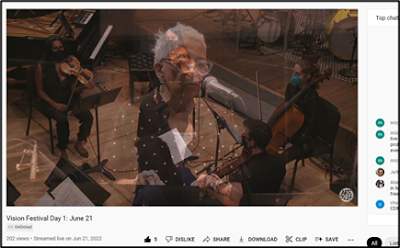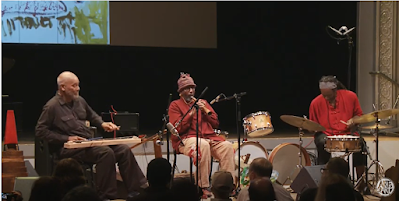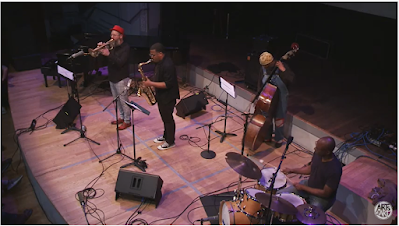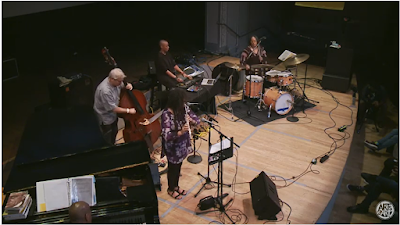 |
| Vision Festival 2022 Logo, from Arts for Art |
Unable to be in New York this June, the Free Jazz Blog took part in the The Vision Festival this year from afar, enjoying the high quality video stream, but missing the community that forms around the festival ... and some of us missed the merch tables too ... however were happy to virtually attend and share our impressions.
Day 1: June 21, 2022
 |
| Thulani Davis and the RedKoral String Quartet |
It’s hard to call this tribute to Wadada Leo Smith “timely,” because it would have been timely at any point in the last three decades. Maybe timeless? Let’s see how that works.
This is not a retrospective, despite the lifetime achievement language, but a curated evening of the artist as of today. It begins with a healing ceremony, an Albert Ayler tune played duet by Smith and Pheeroan akLaff. The density grows with each section of the night. The RedKoral Quartet plays Smith’s String Quartet #10, “Into the Morning Sunlight,” dedicated to Angela Davis. Pensive and light, initially, raising darkness. Mostly pulseless, with a score that eschews downbeats and meter—or the assumptions that lead to those things—and “leadership” passes from chair to chair, context to context.
It’s hard to parse the boundaries between composition, improvisation, collaboration, and interpretation, but my pedantic left brain keeps trying. I wish it would stop.
The string quartet is then joined by Smith’s “combo” (said lovingly), Purple Kikuyu, with Smith and akLaff joined by Sylvie Courvoisier and Linda Dohi on pianos. What an abundance of gifts on the stage! After almost a half hour, the string quartet withdraws and we have Purple Kikuyu on their own. akLaff’s drums are extraordinary, really driving the emotion of the group. Listening to this is like listening to an ecosystem, moving from focus to focus, each driven by intention. The whole driven by emergence.
It’s during this sequence that we get the most of Smith’s playing (along with the duets at front and back), and that is a joy. If nothing else, though, this evening reminded anyone who needed reminding that while—yes—Smith is a fantastic instrumentalist, he is more completely a preternaturally persistent composer and creator of structures that provoke genius.
Two film clips of Smith from Robert Fenz, and a short set with poet/playwright Thulani Davis complete the evening before the closing, joyful duet prayer. Aside from the content of each set itself, the curation was expert. It even had, if you will, a story arc. Beginning small, opening up to lush combinations of musicians and music, and ending small again. A wonderful evening, even viewed virtually.
- Gary Chapin
---
Day 2 / 7:00 pm
 |
| Matthew Shipp Quartet |
Matthew Shipp – piano
Jason Kao Hwang – violin
Michael Bisio – bass
Jay Rosen – drums
Katy Martin – projected paintings
They played one tune with a video of Katy Martin creating paintings behind them. And the interactive with the livestream was full of crossfades between performers from a variety of angles that allowed them to really see their interactions as well as their physical movements. Whether it was a shot of Michael Bisio bowing his bass or Jason Kao Hwang slashing his bow across violin strings, Shipp doing slow whirlwinds to comp in time with rollicking thunder of the band or Rosen keeping time shown from above, I felt placed in a unique perspective.
Oh, and the music was good, too. Hwang’s name was familiar to me but not his playing as much.
He seemed totally integrated into the spirit of the evening whether plucking his violin or coaxing screeching wails from it as Bisio and Rosen locked into a deep-timbre foundation for the band to build on complete Bisio’s thoughtful forays and Rosen’s spicy rat-a-tat-tat’s, respectively. . As the music unfolded so did Katy Martin’s work on screen behind them. For me it was tough to get an appreciation for her work at first but like the snail climbing Mt Fuji in Issa’s haiku it went “slowly, slowly” then got to the top and kept going.
The quartet plus one left me with a deep impression of the physicality of performance. It leapt through my laptop’s screen and speakers as a process always in the now, wrapped up in the destinies that bring this music and art to our world. The five made the 45+ minute set seem almost effortless…um, wow!
- Matthew Banash
Day 2 / 9:30 p.m.
 |
| Heart Trio (Formerly William Parker Trio) |
William Parker – bass, percussion
Hamid Drake – drums, frame drum
Cooper-Moore – homemade instruments
Lois Eby – projected paintings
Some angles of the live stream were from the back of the house and back of the band. And the direction was good, in my opinion, dealing with live and recorded images will maintain the intensity and integrity of both was a challenge met. But…how are people in the front row sitting still for this set? I’d pay to watch Parker and Drake look at a phonebook let alone play it and add Cooper-Moore’s deft playing of an array of homemade instruments this trio made music to accompany space travel from the sometimes dismal current state of world affairs to that musical big bang where we’re all from and yet toes rarely tapped and some even sat with arms folded! But that didn’t let me sour on this gig one bit, and the livestream really made me feel a part of it.
Cooper-Moore dressed in ascetic black from head to toe save for some gray crocs, Parker looking like a shaman in a toque and Drake dressed in red top and black pants looked like a line-cook from an Asian restaurant, had the spaceship plenty fueled up though and through two songs full of riffs that sounded contemporary but folkloric at times they rode ebbs and flows with Eby’s colorful, Zen-inspired, Miro-like works displayed behind them. Eby’s work adorns many of Parker’s releases and the union works well in real-time, too.
Parker and Drake know groove, and whatever the origin of the former’s instrument or rhythm the latter plays on his spare kit is usually transcendent. But the jaw-dropper tonight was Cooper-Moore playing an assortment of homemade bows, harps, and banjos with the physicality of a fervid piano player. Will Cooper-Moore wizardry at the forefront the three dialed up fluid grooves that danced around and through free funk, psychedelia, thanks to the banjo’s panoply of sounds, and even Don Cherry summoned through Parker’s musicality with a little horn. Do yourself a favor and a service, check out what they all were because Parker listed them all at the end of the set, but I was too awestruck one thousand miles away thinking, “If this music is where we’re all from, I hope we can get back there someday.”
- Matthew Banash
Day 3 / 7:30 p.m.
 |
| C’est Trois |
jaimie branch – trumpet
Luke Stewart – bass
Tcheser Holmes – drums
Scott Kiernan - live video art
This set was the toughest for me to enjoy but would ultimately be the most rewarding if I didn’t believe in Three-Way Ties. As the band began playing and the Scott Kieran’s video images materialized and dissipated on screen the thought occurred to me, and don’t hate me, but it went like this, “Oh, Ok, the slow, meandering chaos of sights and sounds until the apogee and climax then let the dust settle and turn out the lights.”
And that wasn’t a cool feeling because being familiar with these three musicians it just felt as if I wasn’t giving them a chance. Turns out I wasn’t, and Scott Kieran helped me stay the path with his work, a blend of retrograde cable access knob twisting, and hallucinatory color schemes mixed matched with old Windows screensavers trick that looked like a hall of mirror that distracted me for hours staring at my computer screen at old sales jobs back in the early 21st century. The video entranced me as the band seemed to settle into their instruments. Subtle indeed.
Subtle as a hammer it would prove because this set illustrated how the performance comes alive, originating, and juxtaposing ideas, as muffled trumpet riffs or squiggles of manipulated sound coalesced over the fluid rumbling of Stewart and Holmes.
Branch played a spoken-word vocal sample which said, “To truly choose to love is heroic.” I was still wrestling intellectually with the idea that it was fun to see the expansiveness of each set but maybe a little variety of shorter tunes would work, too? Granted it was not a heavyweight wrestling match but at about 20 minutes in their set C’est Trois took me home to Jesus.
The construction of this piece revealed the group as one mind playing against itself, establishing, and expressing new ideas while also challenging itself to develop and express a response. What do you set up and how? How do you respond and why? And can one do it all in real time in the real world? That’s all the navel gazing as I’ll do out of deference to and respect for you dear reader as well as the artists, but it was the light bulb for me. It was the point of waiting without realizing it. Yes, transcendent, it helped me understand what those words, “To truly choose to love is heroic,” not only meant but what they could mean. Then Branch concluded the gig by fiddling with some sounds and the trumpet as if to say, “Ok, what’s next?” And it tied the whole experience together for me. Unity. In this world, unity can go a long way.
C’est Trois’ set outlined and explained the three shows to me - The music isn’t unorthodox; it just isn’t orthodox. One needs to devote time and attention to it while tapping your foot or bobbing your head. These three groups make music and visuals that are not soundscapes or diversions as much as landscapes where my mind roams finding freedom, inspiration, and damn good music.
- Matthew Banash
Day 3 / 9:30 p.m.
 |
| Red Lily Quartet |
James Brandon Lewis' Red Lily, this night a quartet, featured the front line horns of cornetist Kirk Knuffke and saxophonist James Beandon Lewis, and the rhythm section of bassist William Parker and drummer Chad Taylor. The configuration is vaugly reminiscent of early Ornette Coleman with Don Cherry, and the opening moments of the set drew a direct line to the classic free jazz of the early 60s as Lewis and Knuffke wove in and out of each others melodic lines, partially in harmony and one hundred percent in sync. Lewis was the first to break away to a solo, which was both imbued in the jazz tradition and superbly unfettered. He played increasingly free until Knuffke joined with a thrust of trills and melodic snippets that then followed a similar path. The reparte between the two is infectious, riff after riff, circling around each other, building to one peak after another. As the quartet closed in at about the 20 minute mark, the focus panned to the bass and drums. Parker and Taylor are infallable, and their driving support ensured that the quartet's energy never wavered (as if that was even an option!).
My colleague, Kenneth Blanchard, reviewed this group's release, Jesup Wagon, when it came out and heard the same linkages to Ornette, as well as the powerful saxophone of David Murray in Lewis's playing. He wrote, "The jazz is simply exquisite. Each theme is richly romantic and follows traditional form: the theme stated and used as portal to new realms of design space." So while the line-up for the evening's show was a quartet, minus cellist Chris Hoffman, the music was just as powerful and maybe even more focused than it was on their debut release.
- Paul Acquaro
Day 3 / 10:30 p.m.
 |
| Nicole Mitchell Ensemble: Dreams of Awakening |
- Paul Acquaro
Day 5: June 25, 2022
 |
| Francisco Mela, drums, and Patricia Nicholson, movement |
One starts to pick up on patterns. For me, along with all the regularly advertised stuff, this has been a festival of bowed string discoveries, poetry/music, and unusual ensembles. I haven’t been able to see every day of this, but on Day 1, I saw Thulani Davis with Wadada Leo Smith and the RedKoral Quartet, and her poem— Billie Holiday, Dark Lady of the Sonnet—was the gravitational center of the evening.
On day 5, Jason Kao Hwang’s Myths of Origin for 30 Strings started us off with shouts and hammers, and then moving through a collection of “stories,” told by the ensemble and the improviser. I don’t know for a fact that Butch Morris influenced Hwang, but this performance made me supremely grateful to Morris that conduction has become a thing that improvisers do. The soloists were fascinating, without exception, but violinist Gwendolyn Laster (I think! Documentation wasn’t clear, but she appeared again on Day 6) held me especially transfixed. Holy cow.
Knife and Rose (Patricia Nicholson – text, movement / Ellen Christi – voice / Jean Carla Rodea – voice / Francisco Mela – drums, voice) partnered two vocalists with drum and dancer. Monique Ngozi Nri, poetry, and Ahmed Abdullah, trumpet launch into an intense duet (we are told by the presenter that it is “very charged.” The two get the audience clapping a beat and start a chant that, tapping into Abdullah’s abundant Sun Ra connections, begins:
We hereby declare ourselves to be another order of being
Ngozi Nri’s poetry has a different character from what we’ve heard before. More colloquial. More storytelling. More movement. Rather than being a poet backed by a band (however great), the poet-trumpet pairing feels genuinely intimate—possibly because they’re married, but I’m not going to presume! The duo access a broad humor and sensuality that I haven’t heard yet in the festival. My high point for day 5. Evoking Sun Ra is one clear way to my heart.
The sky is a sea of darkness when there is no sun.
The two ensembles of the evening are Watershed (Steve Swell – trombone, comp. / Karen Borca- bassoon / Rob Brown – sax / Melanie Dyer – viola / Bob Stewart - tuba / TA Thompson – drums / guest, Dave Burrell – piano) and Natural Information Society (Joshua Abrams – bass, gimbre / Lisa Alvarado – harmonium/ Jason Stein – bass clarinet / Mikel Patrick Avery – drums / Special guests: William Parker – bass, gimbre / Hamid Drake - drums).
Watershed trods the ground of its veteran out members. Rob Brown is effortlessly great, as are Swell, Stewart, and Burrell. The standout for this half hour, though, was Melanie Dyer, on viola. I am completely willing to admit that I might be focusing on bowed strings because that’s what happens to fascinate me this month. Even so, every review is written in the throes of some fascination or other, AND Dyer’s playing was some scratchy davis.
Natural Information Society took us into the groove of the grooves, using percussion and a hand pumped harmonium to lay the path. The traditional instruments playing repetitive, trance inducing, traditional sounding pieces brings to mind elements of ambient minimalist work, especially when Hamid Drake sets a run like hell drum drive under it all and Joshua Abrams starts triggering his pedals. There are no soloists to speak of for a long while. They are all individuals serving the ensemble. Eventually, Stein rises (metaphorically) with his bass clarinet and amplifies the greatness of the work they’re doing.
- Gary Chapin
Day 6: June 26, 2022
 |
| “Ain’t nothin’ real but love.” Oliver Lake |
This afternoon dedicated to Oliver Lake is another masterpiece of curation—full kudos to the programmers at Vision. JD Parran and his group, Spirit Stage 2, lays a foundation with Lake compositions that is so solid you could build anything on it. The group playing and improv are very joyful, with Parran, Bill Lowe (bass trombone), and the aforementioned Gwendolyn Laster standing out. Add to this dance and headdresses. Another reminder that “this kind of thing” is trans-multi-media at its heart.
Lake’s JUSTICE with Sonic Liberation Front fills the next block with outplaying, choral support, and Lake’s poetry. The choir is charming, skilled, and beautiful, the ensemble and poetry are all strong. (Again, another great violinist, Veronica Jurkiewicz. I think I’ve developed an idée fixe.) For all that, it’s only when Lake re-emerges with his Trio3-mates Reggie Workman and Andrew Cyrille that his poetry really explodes for me. The subject matter itself explodes with rage. “I already wrote my I can’t breathe poem.” Truly a tour de force. Again, the poetry is the high point of the evening for me.
I was VERY MUCH looking forward to David Murray World Saxophone Quartet, progeny of the original WSQ, with Greg Osby, Bruce Williams, and James Carter. Unfortunately, this was the only part of the festival I saw that suffered from tech difficulties, with only two of the World Saxes being audible. That got fixed and the group failed to disappoint. Being honest, Lake’s work in the WSQ was where he had the greatest impact on me, and, I think, the field. So many sax quartets. How many would be there without the WSQ.
Writing about the Wadada Leo Smith night I talked about the vision of the artist as an instrumentalist and as a composer/visionary. I have to admit it felt like an absence that Lake didn’t play alto at all. I wasn’t disgruntled or anything, I just missed it. I do not know if there’s a reason for this (health, etc.) and I didn’t pry. Given the abundance of glory that Vision staged this afternoon, it seems ingracious, maybe even churlish, to bring it up.
- Gary Chapin












0 comments:
Post a Comment